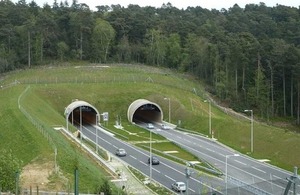Roads for the 21st century
Reform to the strategic road network in England.

- reforms tackling decades of underinvestment in roads to be backed by legislation
- Highways Agency to become publicly owned company
- additional funding of £500 million for electric vehicles and £12 billion for road maintenance and resurfacing
England’s major roads today get a guarantee of a large increase in funding, locked into a long term settlement, backed by law.
The national network of motorways and trunk roads will get extra lanes, smoother, quieter surfaces, improved junctions and new sections in key areas under the plan published today (16 July 2013) by Transport Secretary Patrick McLoughlin.
Fully funded in June’s spending review, £28 billion of investment - which includes a trebling of funding for motorways and major A-roads - will lead to the biggest ever upgrade of the existing network. The focus will be on cutting congestion and minimising the environmental impact of roads, including an extra £500 million to make Britain a world leader in electric vehicle technology. These measures complement record investment in rail, ambitious plans for HS2 and continued funding for buses to ensure growing demand for travel does not swamp the road network. They also deliver on the government’s commitment to providing the infrastructure needed for economic growth.
The government’s new command paper, Action for roads, will see the Highways Agency turned into a publicly owned company with six year funding certainty for capital projects and maintenance. This funding and reform will be underpinned by legislation so future governments cannot walk away from these commitments. It will give the construction and maintenance industry the confidence they need to recruit and train skilled workers to deliver this increase in transport projects over the coming years. It is estimated that the reforms could save £600 million for the taxpayer.
Today’s (16 July 2013) package also includes a boost for low-carbon road travel. By committing £500 million to support the UK ultra-low emission vehicle industry the government is demonstrating its determination to support UK jobs while achieving the twin goals of decarbonising motor vehicles and improving air quality. In addition, bridges and tunnels will be built to help cyclists and walkers to move between communities where motorways and major A-roads make these journeys difficult.
The scale of additional funding being made available for strategic roads will allow more investment in environmental safeguards to help resolve and reduce long-standing environmental problems. These could include better landscaping, tunnelling, ‘green’ bridges and noise barriers to improve roads’ environmental performance.
Patrick McLoughlin said:
Our major roads are vital to the prosperity of our nation, connecting people to jobs and businesses to markets. They carry a third of all traffic and two thirds of all freight traffic but in recent decades we have failed to invest properly in them.
That underinvestment has seen us fall behind many of our economic competitors. Since 1990, France has built more motorway miles than exist on our entire network, while Canada, Japan and Australia all spend four times more on their roads than we do.
Today’s (16 July 2013) changes will bring an end to the short-term thinking that has blighted investment in England’s roads so that we can deliver the infrastructure our economy needs. Backed by the government’s £28 billion commitment, they will give us a road network fit for the 21st century and beyond.
Today’s (16 July 2013) announcement follows the Prime Minister’s call last year to set out a comprehensive and ambitious vision for the road network to ensure that it is delivering for business and the economy.
The government’s reform and funding package represents the biggest ever upgrade of our existing roads, including:
- 221 extra lane miles of managed motorways, linking existing stretches between the North West, Birmingham and London to create a new managed motorway corridor
- 52 major projects funded with funding available for further enhancements to be identified through a comprehensive review of the network’s performance
- schemes to improve important freight routes, like the A14 and four lane capacity on the M4 from London to Reading
- £12 billion for road maintenance over the course of the next parliament with £6 billion of this for maintenance and resurfacing 80% of our motorways and major A-roads by 2020
- the remaining £6 billion will be spent on tackling the backlog of maintenance and reduce potholes on local roads which make up the rest of the country’s road network
- feasibility studies to solve problems at the most notorious hotspots on the road network - the A303 to the South West, the A1 North of Newcastle, the A1 Newcastle to Gateshead, trans-Pennine routes between Manchester and Sheffield and the A27 on the South coast
- faster delivery - work is already underway to look at how schemes can be planned and delivered more quickly so that the benefits of these new schemes can be felt as soon as possible
The government will introduce a legal framework to guarantee investment through a roads investment strategy. This model already exists for the railways and it will set out plans and performance criteria for the next five years of building and maintenance as well as the next ten years of project development.
The Department for Transport intends to consult on these proposals in autumn 2013.
Notes to editors
Action for roads: a network for the 21st century.
Department for Transport’s updated traffic forecasts.
Today’s (16 July 2013) announcements are in line with the recommendations made by Alan Cook in his review of the Highways Agency’s work: A fresh start for the strategic road network.
HMT’s Investing in Britain’s future
Roads media enquiries
Media enquiries 0300 7777 878
Switchboard 0300 330 3000